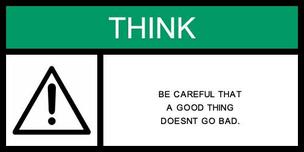
However, promoting personal Bible reading (without training) and the independent discovery of God’s truth (outside of community and well-trained teachers) has contributed to the creation of 34,000 denominations in the last 500 years. With a Bible in hand, Christians can justify reasons for dividing as "biblical." Opinions, causes, or revolts can slap a verse in their language on their hobby horse and ride it down whatever road they want. Individuals and groups, even with the best of intentions, create new “biblical” truth by mixing their culture, experience, hermeneutical incompetency, prior indoctrination, politics, personal preferences, etc. And who can blame them for standing up for what they believe? If you think you’ve figured out “what the Bible really says” about God, shouldn’t you follow your conscience like Luther and form a more “biblical” church?
A classic response to my presentation of “How Bible Reading Destroys the Church” (read Part One) is: “But there was a guy in Asia who found a Bible and became a Christian after reading the New Testament. And he had no one to help him figure out what it meant.” I understand the point. And I respect the optimistic reminder that unaided Bible reading can do some good. I have read the stories and listened to the testimonies. I know it happens.
Some individuals grasp the basic message of God’s love and forgiveness from unaided Bible reading. However, every good anecdote has its evil twin. Confident Bible readers have created a wild array of unwarranted beliefs and practices “based on the Bible,” launching new denominations and even new religions in the process. The biggest problem the Evangelical Church of India faces right now is the unintended negative consequences of rapid church planting. Untrained rural leaders launching churches in isolation from the broader community, but with a Bible in hand, has rapidly produced strange “biblical” teachings.

We can more accurately interpret the Bible and protect the church from bullets of bad new “biblical” doctrines. The occasional success does not excuse us from setting a higher standard. But we must let go of a simplistic view of Sola Scriptura. No more me + Bible + Jesus = the Christian life.
The Protestant principle of Sola Scriptura is an illusion, or at least an impractical ideal. Martin Luther’s conscience was not “captive to the Word of God” as he claimed at the meeting in Worms, Germany. The Word of God was captive to his conscience. What he felt it rightly meant controlled its message.
You may separate yourself from large Christian denominations mishandling Scripture, as Luther did from the Roman Catholic Church, but you can’t separate from yourself. Your internal preferences and presuppositions always shape the Bible’s meaning. Your lack of historical context and inexperience interpreting various genres in the Bible will loosen the meaning from the author’s original intent. If we translate, print, and distribute paper, digital, and audio Bibles in every language, we are setting ourselves up for a million Luthers launching a million splinter groups. The Bible in each native language will be bound to various “consciences” and therefore various interpretations. Jesus’ dream of unity will suffer more.
So how do we read the Bible without destroying the church?
Some sentences in the Bible have a simpler form. God is love. Love God. Love your neighbor. But all of the Bible, including these simple sentences, requires attention to historical and literary context to discern its meaning. The apostle Paul told his disciple Timothy, “The things you have heard me say in front of many witnesses entrust to reliable people who will also be qualified to teach others” (2 Tim 2:2). Enabling each generation to properly understand Jesus and live a godly life in light of the Scriptures requires training.
Timothy had a head start. Paul reminded him, “From infancy you have known the Holy Scriptures, which are able to make you wise for salvation through faith in Christ Jesus.” Most people don’t start with such extensive Bible literacy, but like Timothy, we all need a trusted mentor like Paul to teach us how to accurately interpret the Scriptures. That’s why I designed a 15-hour Bible Interpretation Seminar. People who have been told for years to read the Bible regularly can begin to learn how to interpret it accurately, in all of its historical, literary, and theological complexity.
The need for training everyone is not a new idea. By the 2nd Century AD early churches had developed a 3-year instructional path for new believers, rooted deeply in the Scriptures. Modern evangelical churches typically replace the 3-year catechism with 4-week “new believer” courses. It’s a classic example of failing to learn from history. Read more about Early Church Catechesis here.
Our western democratic sensibilities are repulsed by years of required training. Isn’t telling people to wait for 3 years before they can determine for themselves what God is saying “elitist”? No. I’d say it’s wise. Churches requiring Christians to complete training in Bible interpretation acknowledges we all have different levels of competency. It makes a clear point about the time necessary to develop the right skills and attitudes. The “priesthood of all believers” in 1 Peter 2 may give everyone equal access to God’s presence. It does not mean everyone understands Scripture equally. That’s why Paul has to teach Timothy and tell him to teach other teachers. So my recommendation is: All churches should re-institute (similar to the original 3-year catechesis for new believers) a required multi-year Bible training process rather than just encourage Bible reading.
Paul did tell Timothy to “entrust [what Paul had taught him] to reliable people who will also be qualified to teach others.” That was Paul’s plan for keeping the church on track. Each generation identifies leaders in the next generation who can teach others about the faith. How bad have we screwed that up with a radical democratizing of Bible study?
Paul reinforces this point in Ephesians 4:11-12, saying God has gifted “teachers to equip his people.” The plan is not just “me and the Bible.” I don’t read the Bible and follow my inner voice to the meaning God has for me. The plan is gifted and reliable teachers equipping me. That doesn’t fit in individualistic cultures, but it’s how God structured the church to function “so we all reach unity in the faith” (Eph 4:13).
But here’s the problem right: How do I know a teacher is reliable? You may not be in a position to judge, but try this simple test when possible. First, look at their character. Paul told Timothy that a person who “handles the word of truth accurately” will be godly, kind, loving, righteous and peaceful (2 Timothy 2:14-26). That’s not enough, but it is non-negotiable. If your current Bible teacher lacks character, you want to look elsewhere. Second, evaluate their training. If they were not adequately taught, prepared, and mentored, then Paul’s plan in 2 Tim 2:2 has broken down. They should have had reliable teachers train them. Third, how is the teacher evaluated by reliable teachers in other believing communities—not just his buddies in the same coalition? That leads us to our next practice to protect the church: accountability in community.
3. Accountability. Interpret the Bible in community
When Paul advised a “church gone wild” in Corinth about assessing all types of “words from the Lord,” he said: “the community should weigh carefully what is said” (1 Corinthians 14:29). Good advice. A community of Bible-studying Jesus people can keep you in check. When the Jews in Berea checked Paul’s message about the Messiah against Scripture, they did it together (Acts 17:11). Paul’s letters were meant to be “read out loud to everyone” (1 Thess 5:27).

Remember Jesus came to form a community not start up a bunch of individual relationships with people who don’t interact with one another. In fact, the 53 “one another” commands in the New Testament can’t be obeyed without community. That’s why I love Biblica’s new Community Bible Experience. Participants reverse the individualistic reading of Scripture promoted since the Protestant Reformation. The Community Bible Experience requires you to read and process Scripture together. Hopefully it can quell the evangelical belief that reading your Bible on your own is the highest form of Christian spiritual discipline.
4. Character. Embody virtue as you interpret
Here are 3 virtues for holding and forming your “biblical” opinions properly:
1. Humility: I could be wrong so I’ll accept correction
2. Openness: You could be right so I’ll listen
3. Generosity: I am fair and gracious in my critiques
The goal isn’t to win arguments. Paul says, “The Lord’s servant must not be quarrelsome but must be kind to everyone, able to teach and to learn, not resentful. Opponents must be gently instructed” (2 Tim 2:24-25). Practicing these virtues would prevent division while we all progress in understanding. Unity doesn’t require everyone to be under the same hierarchical leadership structure or in the same denomination, but it does require these virtues.
If everyone could read “what the Bible says” and arrive at its meaning, then (1) training, (2) reliable teachers, (3) a mature community, and (4) interpretive virtues could be optional. But the “pervasive interpretive pluralism” Christian Smith has chronicled shows we have a problem. Internal assumptions shaped by culture, language, tradition, translation and personal experience turn “what the Bible says” into what we think it means. If we ignore our distortion or our incompetency to interpret accurately within a Bible book’s literary and historical context, then we are one more dangerous Protestant. We mistake our views for what “the Bible says” and birth a new branch of an ever-dividing church. As Trevor Hart warns,
Simple appeals to ‘what the Bible says’ are always the sign of (no doubt unconscious) subservience to an interpretive tradition, not liberation from it. That which we mistakenly think we have escaped from is in reality free to exercise all the more influence over us, and is therefore all the more potentially dangerous. (Faith Thinking: The Dynamics of Christian Theology, 167)
Bible Interpretation Competency Test
So how do we know if our assumptions or untrained interpretations are mucking up the Bible or moving toward its meaning?
I can’t give you a simple answer right now, but I am working on a solution. I am designing a Bible Interpretation competency test. The B.IQ test (or something like that… please help with naming ideas) will assess your level of competency in both the skills and attitudes required to discern the original meaning of biblical authors. It won’t mess with how you create systematic theology or life application from that meaning, but it will test whether you distort the author’s message by reading your presuppositions or applications into the original meaning.
I have taught and taken multiple courses in Bible Interpretation (commonly known as “Hermeneutics”), but no one has developed a simple instrument to assess one’s interpretive strengths and weaknesses. It’s time to change that. We have IQ, EQ and CQ tests. We use StrengthsFinder and DISC assessment tools to figure out our personal and professional strengths and weaknesses. It’s time for a Bible Interpretation competency test that produces a clear plan for how to handle the Bible better. It’s time to know if your multi-year Bible interpretation course at church has made you a well-trained, reliable Bible teacher.
If you have a few degrees in Biblical Studies and want to join the B.IQ Design Team, let me know. I’ll let everyone know when the Kickstarter campaign goes live. You let me know if your church launches a required and robust Bible training program or if you need help doing so. And I’ll keep posting at Reenacting the Way’s blog about the Bible interpretation training we need and teasers from the forthcoming B.IQ test.






 RSS Feed
RSS Feed
